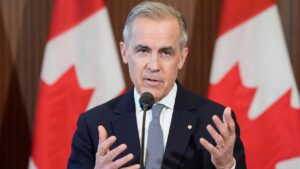From 2h ago
Most indicators tracking the UK housing market have continued to weaken in recent months, the Bank of England points out.
The minutes explaining today’s interest rate decision point to the latest data from lenders showing that house prices have fallen this autumn, after rising sharply during the pandemic.
They say:
Although the official UK House Price Index had increased strongly in October, house prices had fallen quite sharply in the Nationwide and Halifax indices in October and November.
The November RICS survey had shown further declines in price balances and continuing weakness in indicators of housing market activity.
According to higher-frequency Zoopla data, the volume of offers made on properties by potential buyers had declined to below their normal seasonal levels.
Millions of working people face paying “a Tory mortgage penalty for years to come” following today’s interest rate rise, says Rachel Reeves MP, Labour’s Shadow Chancellor of the Exchequer.
“After 12 years of Tory failure and wasted opportunities, only Labour offers the leadership and plans to stabilise our economy and to get it growing, so we aren’t just surviving, but thriving again.
“Labour’s Green Prosperity Plan, our modern Industrial Strategy and our active partnership with business will get our economy firing on all cylinders.”
Bank of England governor Andrew Bailey has filmed a video clip in which he explains why the UK central bank has increased the cost of borrowing today.
Bailey says the Bank raised interest rates “because inflation is too high” (it was 10.7% in November, and hit a 41-year high the previous month).
He says:
We think it [inflation] will fall back quite sharply from the middle of next year.
And raising interest rates is the best way we have of making sure that that happens.
Bailay adds that “low and stable inflation is vital for a healthy economy” – one where people can plan for the future with confidence and where “hard-earned money keeps its value”.
He acknowledges that higher interest rates have a real impact on peope’s lives, but insists that raising interest rates, “we can bring inflation down sooner”.
Today’s move is yet more bad news for the approximately 2.2 million people on a variable rate mortgage, who are already having to contend with a raft of rising costs.
Many now face paying hundreds of pounds extra a year, as my colleague Rupert Jones explains.
About half of those 2.2 million are either on a base rate tracker or discounted-rate deal. The other half are paying their lender’s standard variable rate (SVR).
A tracker directly follows the base rate, so your payments will almost certainly soon reflect the full rise. On a tracker now at 4.25%, the interest rate would rise to 4.75%, adding ?40 a month to a ?150,000 repayment mortgage with 20 years remaining.
This person’s monthly payment would rise from ?929 to ?969. As recently as June this year, this same individual would have been paying ?776 a month – so their home loan bill has now jumped by 25% in just six months (assuming they have had their deal for a while).
Of course, for those with bigger mortgages, the numbers will be bigger. Up that mortgage to ?500,000 and the payment will rise by ?135 (from ?3,095 to ?3,230).
Raj Badiani, principal economist at S&P Global Market Intelligence, predicts the Bank of England will end its interest rate rising cycle early next year:
“We think the pace of the tightening cycle is set to slow and end in early 2023 to provide the economy some breathing space after several quarters of contraction alongside the fear of excessively tight monetary policy conditions triggering a major housing market correction.
The prospect of inflation being in the free-fall from late-2023 will allow the central bank to start lowering its policy rate from early 2024 to 2.5% by November that year.”
Higher interest rates will drag on UK economic growth, points out Tommaso Aquilante, associate director of economic research at analytics firm Dun & Bradstreet:
“The Bank of England’s decision to raise the UK base rate to its highest level since October 2008 will have significant implications for businesses of all sizes across the country. By making borrowing more expensive, the increase, together with other factors, will drag on economic growth.
“Amid the choppy economic climate, companies need to keep their heads above water and ensure they have a big picture view of the health and longevity of their supply chain, fiscal pipeline, who their partners are and what the end-user is looking for. As readiness in these areas will ultimately help them weather the storm.”
Chancellor Jeremy Hunt says it is important to get inflation down to the Bank of England’s target of 2%.
Responding to today’s interest rate rise, Hunt says:
“High inflation, exacerbated by Putin’s war in Ukraine, continues to plague countries across the world, eating into people’s pay cheques and driving up food and energy prices.
“I know this is tough for people right now, but it is vital that we stick to our plan, working in lockstep with the Bank of England as they take action to return inflation to target.
“The sooner we grip inflation the better. Any action which risks permanently embedding high prices into our economy will only prolong the pain for everyone, stunting any prospect of economic recovery.”
The Bank of England’s policymakers remain concened that inflationary pressures are building in the economy – citing recent price and wage increases.
The MPC says:
The labour market remained tight and there had been evidence of inflationary pressures in domestic prices and wages that could indicate greater persistence and thus justified a further forceful monetary policy response.
This week’s unemployment report showed that regular pay rose by a stronger-than-expected 6.1% in the August-to-October period, the biggest gain since records began in 2001.
The Bank of England is walking a narrow path, as it tries to limit inflation without causing an even deeper recession, says Josie Dent, Managing Economist at the CEBR think tank.
In particular, by raising rates, the Bank is increasing costs for the millions of households that will face higher mortgage costs from next year onwards. This will mean many of these households will have to cut back spending in other areas, leading to weaker economic activity.
However, concern was also expressed today that a tight labour market could lead to more persistent inflation, justifying further interest rate rises.”
The pound has extended its losses against the US dollar, after the Bank of England’s interest rate decision.
Sterling has now lost 1.2 cents, dropping to $1.23 – the lowest level since Tuesday, and further away from yesterday’s six-month highs.
The fact that two MPC members voted to leave interest rates unchanged, while only one wanted a larger rate hike, is weighing on the pound.
Over in Frankfurt, the European Central Bank has followed the Bank of England – and the US Federal Reserve – by lifting its interest rates by half a percent.
It says:
The Governing Council today decided to raise the three key ECB interest rates by 50 basis points and, based on the substantial upward revision to the inflation outlook, expects to raise them further.
In particular, the Governing Council judges that interest rates will still have to rise significantly at a steady pace to reach levels that are sufficiently restrictiveto ensure a timely return of inflation to the 2% medium-term target.
That takes the interest rate on the ECB’s main refinancing operations to 2.5%.
Economists agree that UK interest rates will probably rise further in the months to come, but disagree about where they will peak.
Thomas Pugh, economist at audit, tax and consulting firm RSM UK predicts that rates will hit 4.5% in 2023.
The smaller 50bps hike, which takes interest rates to 3.5%, the highest level in 14 years, suggests the end is in sight for the BoE’s tightening cycle.
However, the minutes of the meeting made it clear that although the end is in sight, there are still more hikes to come. We expect rates to rise to 4.5% early next year and that they won’t start to be cut again until early 2024.
Paul Dales of CapitalEconomics also predicts the Bank will lift rates to 4.50% early next year before cutting them back to 3.00% in 2024.
There were three ways in which this felt a bit like another “dovish hike” from the Bank. First, in November seven MPC members supported the 75bps hike. Today only six members voted for the 50bps hike. Catherine Mann did vote 75bps. But Swati Dhingra and Silvana Tenreyro both voted for no change. They said “the current setting of Bank Rate was more than sufficient”.
Second, the passage in the statement in November on risks to inflation being skewed to the “upside” was dropped.
Third, the Bank dropped the section that pushed back strongly against market pricing that rates would rise to a peak of 5.25%, but that may just be because market rate expectations have since fallen back to 4.50%.
But analysts at ING predict rates will peak lower, at 4%.
In a note to clients, ING’s developed markets economist James Smith says:
For now, our best guess is the Committee implements another 50bp hike in February before calling it a day. The hawks can continue to point to 6% wage growth and the fact that core services inflation is running higher than expected in November.
But today’s meeting is a further demonstration of the delicate balancing act facing the BoE, between mitigating the risks of a tight jobs market on the one hand against mounting concerns about the housing market and the health of corporate borrowers on the other.
We expect Bank Rate to peak at 4% in the new year, although we aren’t yet convinced a rate cut will be as quick to follow as in the US (where we expect cuts shortly after the summer).
The Unite union has criticised today’s interest rate rise, saying it will hurt workers.
Unite general secretary Sharon Graham says:
“The Bank of England’s leadership continues to make the wrong choices. First, they call on workers not to ask for pay rises. Now, they inflict yet more pain during this cost-of-living crisis while the profiteers, who are the real drivers of inflationary price rises, are let off the hook yet again.
“Millions are already struggling and by raising interest rates further the Bank of England is adding even more to that pain. For many this rise could be the straw that ‘breaks the camel’s back’.
The Bank of England doesn’t have to do it and its leadership should be held responsible for the consequences.”
The Bank, though, would argue that it is trying to bring down inflation – which has been driving down real incomes this year.





